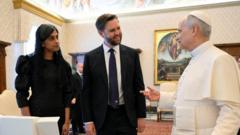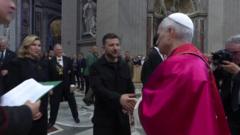Pope Leo XIV's election signifies a transformative moment for the church, balancing American ties with a commitment to global outreach.
**Pope Leo XIV: A New Era for the Roman Catholic Church**

**Pope Leo XIV: A New Era for the Roman Catholic Church**
Pope Leo XIV hailed from the U.S. yet embodies the global mission of the Church, marking a shift in papal leadership.
In a surprising turn of events, Robert Francis Prevost has ascended to the papacy, now known as Pope Leo XIV, following a historic election that has captivated the Roman Catholic community. His dual identity as both an American and a seasoned missionary in Peru places him at a unique crossroads of cultural relevance within the Church. This unprecedented combination marks a notable shift in expectations around the papal role and its geographical affiliations.
Before his election, Prevost was endorsed by Pope Francis, serving in a prominent leadership role that saw him orchestrate the selection of bishops—a position that required not only ecclesiastical knowledge but also an understanding of the evolving church dynamics globally. His tenure as Cardinal was characterized by a bridging approach, promoting inclusiveness and a more grassroots decision-making process within the Church, aligning with the progressive reforms initiated by his predecessor.
Although historically, an American pope might have sparked hesitation due to perceptions of favoritism towards the interests of the U.S., the current geopolitical landscape has redefined such biases. Greater global connectedness has led many within the voting body of 133 cardinals to prioritize qualifications over nationality, allowing Pope Leo XIV to rise without the typical reservations that might have impeded similar candidates in the past.
Vatican analyst John Allen encapsulates the sentiment surrounding Prevost’s election by stating, “He checked all the boxes.” This sentiment reflects a shifting paradigm in papal selections where geography ceases to be a barrier, allowing for a leader who can engage with both traditional and modern facets of the faith.
As Pope Leo XIV begins his papacy, he carries the weight of possibility for a more inclusive and dynamic Church, attuned to the complexities of a rapidly changing world. The significance of his election could herald a new chapter, one that sees the Church further committed to its mission of universal outreach while navigating the intricacies of contemporary societal challenges.
Before his election, Prevost was endorsed by Pope Francis, serving in a prominent leadership role that saw him orchestrate the selection of bishops—a position that required not only ecclesiastical knowledge but also an understanding of the evolving church dynamics globally. His tenure as Cardinal was characterized by a bridging approach, promoting inclusiveness and a more grassroots decision-making process within the Church, aligning with the progressive reforms initiated by his predecessor.
Although historically, an American pope might have sparked hesitation due to perceptions of favoritism towards the interests of the U.S., the current geopolitical landscape has redefined such biases. Greater global connectedness has led many within the voting body of 133 cardinals to prioritize qualifications over nationality, allowing Pope Leo XIV to rise without the typical reservations that might have impeded similar candidates in the past.
Vatican analyst John Allen encapsulates the sentiment surrounding Prevost’s election by stating, “He checked all the boxes.” This sentiment reflects a shifting paradigm in papal selections where geography ceases to be a barrier, allowing for a leader who can engage with both traditional and modern facets of the faith.
As Pope Leo XIV begins his papacy, he carries the weight of possibility for a more inclusive and dynamic Church, attuned to the complexities of a rapidly changing world. The significance of his election could herald a new chapter, one that sees the Church further committed to its mission of universal outreach while navigating the intricacies of contemporary societal challenges.


















